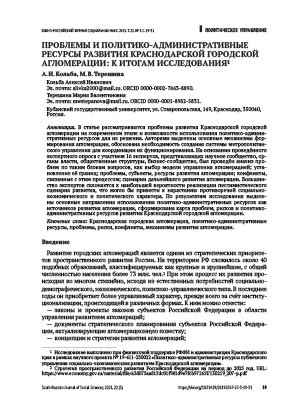Abstract
The article examines the problems of the development of the Krasnodar urban agglomeration at the present stage and the possibility of using political and administrative resources for their solution. The authors highlighted the main mechanisms of the formation of the agglomeration, substantiated the need to create a system of metropolitan administration to coordinate their functioning. On the basis of an expert survey with the participation of 16 experts representing the scientific community, government authorities, public structures, the business community, an analysis of problems was carried out on such blocks of issues as the choice of an agglomeration management model; establishing its boundaries; problems, subjects, resources for the development of the agglomeration; conflicts associated with this process; scenarios for the further development of the agglomeration. Most experts are inclined to the highest likelihood of a pessimistic development scenario, which could lead to an increase in socio-economic and political contradictions. Based on the results of the study, the main directions of the use of political and administrative resources as sources of the development of the agglomeration were identified, a map of problems, risks and political and administrative resources for the development of the Krasnodar urban agglomeration was formed.
Keywords
Funding information
The research was financed by RFBR and the Administration of Krasnodar Krai (research project No 19-411-230022 “Political and administrative resources of public administration for socio-economic development of the Krasnodar agglomeration”).
References
Антонов, Е.В. (2020). Городские агломерации: подходы к выделению и делимитации. Контуры глобальных трансформаций: политика, экономика, право, 13(1), 180–202.
Безлепкин, Н.М. (2014). Санкт-петербургская агломерация: выбор модели управления развитием. Научные труды СЗИУ РАНХиГС, 3(15), 36–41.
Волчкова, И.В., Минаев, Н.И. (2013). Модели управления агломерациями: международный опыт и российская практика. В Экономика и управление, 11(108), 53–57.
Гвердовская, М.Д., Яроцкая, Е.В. (2019). Делимитация границ Краснодарской агломерации. Современные проблемы и перспективы развития земельно-имущественных отношений: Сборник статей по материалам Всероссийской научно-практической конференции. Краснодар, 23–24 апреля 2019 г. (с. 199–206). Краснодар: Эпомен.
Илясова, Е.В., Попова, К.И. (2019). Разработка бренда Краснодарской агломерации как инструмент развития в условиях конкуренции. Экономика: теория и практика, 4(56), 47–52.
Кольба, А.И. (2019). Политико-административное управление агломерациями: проблемы концептуализации. Южно-Российский журнал социальных наук, 3(20), 76–90.
Кольба, А.И., Терешина, М.В. (2019). Проблемы использования политико-административных ресурсов публичного управления городскими агломерациями: современное состояние исследований. Среднерусский вестник общественных наук, 6(14), 15–36.
Лаврова, Т.Г. (2015a). Краснодарская городская агломерация как центр развития региона. Управленческие науки в современном мире, 1(2), 548–552.
Лаврова, Т.Г. (2015b). Краснодарская городская агломерация: развитие и управление. Проблемный анализ и государственно-управленческое проектирование, 5(8), 80–89.
Любовный, В.Я. (2015). Городские агломерации России: от стихийного к целенаправленному развитию. Муниципалитет: экономика и управление, 1(10), 5–16.
Норт, Д. (2004). Функционирование экономики во времени. Отечественные записки, 6(20). Режим доступа http://www.strana-oz.ru/2004/6/funkcionirovanie-ekonomiki-vo-vremeni
Остром, Э. (2010). Теория рационального выбора коллективного действия. Бихевиористский подход. Вопросы государственного и муниципального управления, 1, 5–52.
Павлов, Ю.В. (2019). Будущее муниципалитетов в агломерации: эволюция взглядов на метрополитенское управление. Экономическая политика, 1(14), 126–153.
Рубл, Б. (2013). Мировой опыт в эпоху городских агломераций: уроки для управления Москвой. Логос, 4, 264–287.
Тамов, А.А., Родин, А.В., Бабичев, К.Н. (2019). Краснодарская агломерация: проблемы интеграции и связанности с учётом особенностей территориально-административного районирования Краснодарского края и Республики Адыгея. Вестник Адыгейского государственного университета. Серия «Экономика», 4(250), 60–68.
Шмидт, А.В., Антонюк, В.С., Франчини, А. (2016). Городские агломерации в региональном развитии: теоретические, методические и прикладные аспекты. Экономика региона, 3(12), 776–789.
Fang, Ch. & Yu, D. (2017). Urban Agglomeration: An Evolving Concept of an Emerging Phenomenon. Landscape and Urban Planning, 162, 126–136.
Kinossian, N. (2016). State-led Metropolisation in Russia. Urban Research & Practice, 1(11), 466–476. DOI: 10.1080/17535069.2016.1275619
Kriesberg, L. (1998). Constructive Conflicts. From Escalation to Resolution. Lanham, MD: Rowman and Littlefield.
Norris, D.F. (2015). Metropolitan Governance in America. L.: Routledge.


